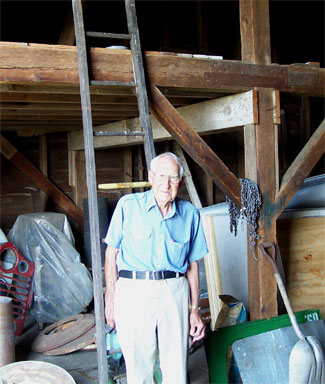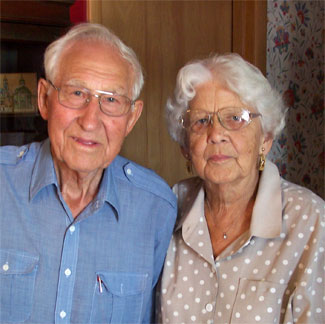Ninety three year old Robert Barth of Minonk has lived a long life full of memories from an earlier time. Born on his father's farm west of Minonk in 1913, he spent most of his life farming before retiring to Minonk in 1995. His grandfather, Michael Barth, immigrated from Germany in 1855 and settled in Boston, Mass. There he worked as a blacksmith apprentice for four years, then came to Illinois, and settled in Minonk. Eventually he purchased 80 acres of land from the railroad three miles west of Minonk for $14 dollars an acre. He cleared the land, burned off the prairie grass, built a cabin and started farming. Back then the government gave alternate sections of land to the railroad and the farmers seven miles on either side of the intended railroad line in order to encourage the railroad to lay track. Robert's father told him that the prairie grass was so high that you had to ride a horse in order to see where you were going.
Robert said that his grandfather told his father-in-law, who lived in Germantown, that he intended to farm near Minonk. The father-in-law was skeptical and told him that he couldn't farm that swamp land near Minonk.

Robert Barth in the barn that he restored
Grandpa Barth told his father-in-law that he was getting a new spade for Christmas. The next spring he started draining the ground by hand using the spade to dig the trenches for laying tile. Every year after that he would give a new spade to one of his sons so that they could in turn help dig the trenches to lay tile for draining the soil so that it could be farmed. That is pretty much how the land was originally tiled, according to Robert. He said that during the summer the coal miners from Minonk would come out to the farms and dig trenches for tiling to earn some extra money. The final solution to the drainage problem, according to Robert, was the digging of the Crow Creek drainage ditch in 1929. The 12 mile long ditch was dug for $13,000 and paid for by assessments from those who owned farmland along the ditch. Eventually, an annual volunteer assessment was established for all farmers in the area since the farmland not adjoining the ditch also benefited from the better drainage.
Robert said that his father was second to the youngest son. When he got married Robert's grandfather told him that he had to leave and start out on his own.
Robert's grandfather owned 260 acres at that time and gave each of his nine sons 80 acres when they got married. So Robert's father built a house 1/4 of a mile down the road from the family homestead.
Like most farm youth back then, Robert was raised on a farm that used horses instead of tractors and there was no indoor plumbing or electricity. While he has many pleasant memories as a child, he does remember being tied to the clothes line so that he wouldn't run away from home. He also has many memories of working with his five uncles on the farm. One memory that wasn't very pleasant was the time he was helping stacking hay being loaded into the barn. The hay bales were loaded with a fork that was lifted up by a pulley attached to a rope that was pulled by horses outside the barn. Suddenly, Robert's leg got caught by the hay fork and lifted him up to the barn ceiling. Luckily, one of his uncles yelled down below to stop the horses before Robert would have been slung out the hayloft door and down to the hayrack. Robert says he still has a scar on his leg from the fork.
Another more amusing memory was the time that his uncles brought a horse into the barn and the horse fell through a hole in the floor to the stable below. Fortunately, the horse survived unhurt and no one ever told the elders about the mishap.
Robert wanted to go to college when he was a young man but times were hard. The Great Depression was just starting and money was scarce so Robert went to work for an uncle in Rochelle, Illinois. He was paid $30 a month as a hired hand on the farm. Gas was 10 cents a gallon, corn was bringing 11 cents a bushel and oats 5 cents. More than once Robert's uncle did not even make enough to pay him. Robert's father heard about the Wall Street crash of 1929 on his battery radio and he told Robert that "We are in trouble now". People in Minonk had a hard time getting food. Farmers would take food into Minonk to help feed friends and relatives.
Robert said the only thing that saved the farmers back in the Depression was the Federal Land Bank which made loans at 3% to farmers to help them get back on their feet. Prior to that many farmers lost their farm to the bank and then that farm was bought by a nonfarmer at a bargain price.
When Robert married his wife Roberta, he started farming on his own.
Robert returned to farm on the original 80 acre Barth homestead. At first he used horses, but he soon started using a tractor saying that he didn't like farming with horses. One of Robert's achievements that he is proud of is his restoration of the old barn. Going against the advice of others he used railroad jacks and ropes to bolster up the barn so that it stood straight again. Robert gradually added more acreage to his farm and became a successful farmer during the golden age of farming in the 1940's and 1950's. He and his wife Roberta raised two daughters, Jeri Sue and JoAnn.
In addition to farming, Robert was active in civic affairs as well. He served on the Woodford County Board for two terms and was on the St. Paul's church council for four terms and most recently was on the committee to build the Westside Park pavilion. After retirement, he and Roberta began to take travel tours. One tour he remembers in particular was in London in 1976 when he was able to buy 2 tickets for a performance at the Strand Theatre. What made the tickets special is that the tickets were for the seats reserved for the Queen and her mother.
The Queen was unable to attend the performance and those were the only seats available when he went to buy his tickets. Robert said that he and his wife drew many stares from onlookers as they sat in the Queen of England's box seats.
Robert and his cousin, Ruth Park, are the oldest remaining Barth family members of his generation. He is still active and alert at 93 and looks and acts 20 years younger. When asked the secret to his longevity, he said that his wife Roberta is a big part of it. Roberta replied that it was due to his hard work. It sounds like they learned the secret to a happy marriage.

Robert and Roberta Barth